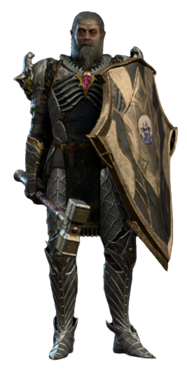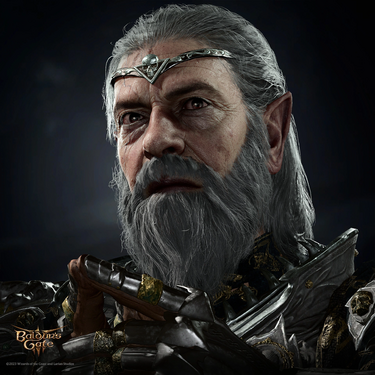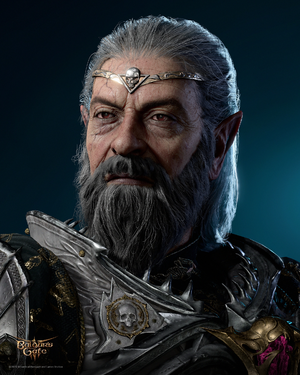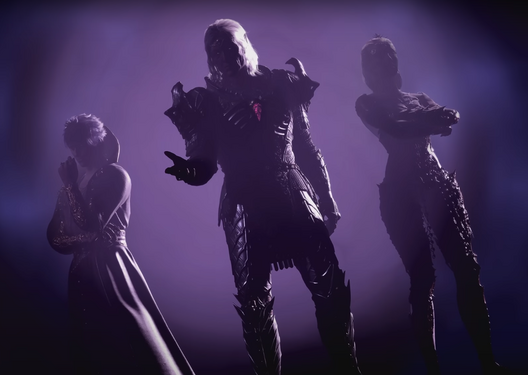Ad placeholder
Ketheric Thorm: Difference between revisions
(→Act 2) |
|||
| Line 150: | Line 150: | ||
* {{MdRarityItem|Journal Log of True Soul Korliss}} | * {{MdRarityItem|Journal Log of True Soul Korliss}} | ||
* {{MdRarityItem|Letter to Ketheric}}, Melodia's deathbed letter | * {{MdRarityItem|Letter to Ketheric}}, Melodia's deathbed letter | ||
* {{MdRarityItem|Madeline's Ledger}} | |||
* {{MdRarityItem|Mason's Log}}, Selûnite resistance member asks Raphael to kill the [[Dark Justiciar|Dark Justiciars]] | * {{MdRarityItem|Mason's Log}}, Selûnite resistance member asks Raphael to kill the [[Dark Justiciar|Dark Justiciars]] | ||
* {{MdRarityItem|Missive from Gortash}}, a letter from Lord Gortash, describing the [[Prologue|crash of the nautiloid]] and urging Ketheric find the Mysterious Artefact | * {{MdRarityItem|Missive from Gortash}}, a letter from Lord Gortash, describing the [[Prologue|crash of the nautiloid]] and urging Ketheric find the Mysterious Artefact | ||
Revision as of 09:11, 27 September 2024
| Overview | Combat |

“Our darling will live again. What kind of man would I be if I didn't raze the world entire for her sake?„
Overview
Once the governor of Reithwin Town, personal disaster and grief drove him down the path of darkness and violence, eventually being defeated in battle a century ago by the combined forces of the Harpers and druids of the Emerald Grove. Now, risen from the grave to lead the Absolute's forces as their general, he seeks to destroy Baldur's Gate and spread the cult of the Absolute.
Background
Risen from the grave a hundred years after the events that lead to his downfall, Thorm serves as the main antagonist of Act 2 of the game, being introduced during Act 1 through dialogue and in-game notes first. As the party searches for ways to cure their tadpole situation, many clues point towards Moonrise Towers and Ketheric himself and the party is ultimately tasked with bringing Ketheric down in order to rid the Shadowlands from its curse.
Through battle with him, and later exploring the Illithid colony under the stronghold, the party discovers there's something more perverse going on with the tadpoles in their heads. Ketheric's alliance with Enver Gortash and Orin the Red is also exposed, and in the process of the fight against him, it's revealed that it was Myrkul that brought Ketheric back from the dead. With Thorm dead, the party now have one of the Netherstone that power the trio, and the clues to their next destination: Baldur's Gate.
Gameplay
- Ketheric is a level 11 Undead boss that retains some features of his past life as a Half-Elf, and one of the main antagonists in the game.
- He can be found throughout Act 2, while being referenced through dialogue and notes in Act 1.
- Fighting him is required in order to obtain his Netherstone and proceed with the story.
- In combat, he's most similar to an Oathbreaker paladin, able to cast a form of Smite with his attacks, as well as having access to Aura spells and able to raise Undead minions.
- Despite his status as a boss, Ketheric can still be disarmed, knocked prone or affected by other types of weapon abilities.
- True to his skill as a general, Ketheric commands his allies to focus their attacks on targets he deems especially dangerous via Deadly Orders.
- The outcome of the quests relating to the Nightsong, as well as dialogue checks, can influence the encounters with him.
Description
Appearance
Ketheric has straight, grey hair kept shoulder-length and tucked behind his pointed ears. His countenance is severe, face wrinkled both by his glare and age, and he keeps a thick, full beard that connects to his hair. Ketheric wears a simple circlet with the skull of Myrkul, and an extravagant, yet well-crafted suit of armor that marks him as the Chosen of the Lord of Bones. His Netherstone rests on his chest, protected by an ornate gold cage.
Personality
Though best described as a man broken by grief, Isobel speaks of a loving, doting father while she was growing up, one who had the admiration of his subjects for being just and fair, full of love for his wife who he adored more than anyone else. Tragedy, however, would turn him into a bitter, wrathful man, willing to cleanse Reithwin from any Selûnites just to spite the Moonmaiden for abandoning him.
Whatever the man he once was, the Ketheric the party encounters is a callous one, evident by his dismissal of Minthara and the goblins, ordering their torture and execution for failing him. Though courteous when needed, he will quickly condemn the party to death should they defy his orders. Above all, however, he is relentless in his pursuits, willing to burn the entire world just to be reunited with his daughter.[4]
Though he changed his patron god twice, he proved to be an ardent believer of each: for Selûne, he built Moonrise Towers in her honour, for Shar, he built a grand temple under town in her name and for Myrkul, he amassed a great army ready to raze Baldur's Gate to the ground.
Through it all, he kept ![]() a note from Isobel close to him, showing that deep down a small part of him still remembers the man he once was.
a note from Isobel close to him, showing that deep down a small part of him still remembers the man he once was.
History
Governor of Reithwin
A devout worshipper of Selûne, Thorm lived with his wife Melodia and daughter Isobel near the town of Reithwin as governor of the region. Such was his devotion to the Moonmaiden that he would commission a local mason, Morfred, to construct a grand bastion in her honour: Moonrise Towers.
Yet disaster struck the Thorm family when Melodia passed away, leaving Ketheric to raise their daughter alone.[5] With a child in his care, Ketheric persevered, and though doubts plagued his mind, he kept the Selûnite ways. As Isobel grew older, their happy years had a sour note: he disapproved of a budding relationship between his daughter and an immortal Aasimar visiting the town, Dame Aylin, daughter of Selûne.
The conflict would be cut short, however, as tragedy would befall Ketheric once more, and his daughter Isobel passed away.[6]
Conversion to Shar
Grief-stricken and unable to cope with his loss, Ketheric Thorm renounced the worship of the Moonmaiden and turned to Shar, the Lady of Loss.[7][8]
Moonrise Towers, once a bastion of Light, turned into a symbol of darkness and grief, and Thorm would systematically erase all Selûnite trace of the town, forcing all believers of the Moonmaiden to convert to Shar, flee, or die.[9] Those who remained devout to Selûne did so in secret, arranging a ; even as Sharran spies began to infiltrate their gathering places.[10]
In Ketheric's downward spiral into darkness, Shar compelled him to build an army of Dark Justiciars beneath his home town in order to cleanse the world of Light. Ketheric lured his daughter's lover, Aylin, whom he had once quarreled with under Selûne, now trapping her in a prison. He had the immortal demigod serve as a perpetual sacrifice for Dark Justiciar initiates – a design of his closest confidante, the necromancer Balthazar.[11][12]
As terror gripped his town, the Harpers, a loose organization that roots out villainy, saw that Ketheric had committed "Murder, Slavery, and Desecration of Temples Most Holy," and began to seek an alliance to end his reign.[13]
Reithwin soon became the site of a wintertime battle between Ketheric's army and the combined forces of the Harpers and druids of the ![]() Emerald Enclave.[14] Ketheric's Justiciars repelled the combined forces, and the Harpers
Emerald Enclave.[14] Ketheric's Justiciars repelled the combined forces, and the Harpers ![]() unsuccessfully attempted surrender.[15] The result of
unsuccessfully attempted surrender.[15] The result of ![]() a bargain struck between Raphael and the Selûnite-in-secret Morfred, however, took place beneath the town, and Yurgir and his merregons worked to annihilate Ketheric's Dark Justiciar army.
a bargain struck between Raphael and the Selûnite-in-secret Morfred, however, took place beneath the town, and Yurgir and his merregons worked to annihilate Ketheric's Dark Justiciar army.
In the end, the Sharran army was defeated, , and finally Ketheric himself perished.[16] Yet, before the final blow was struck, he would plague the lands with a Shadow Curse that would persist long after his demise, afflicting any survivors from the battle and all the inhabitants left. His body was buried in the Thorm Mausoleum.
Chosen of Myrkul

“I'll tell you a story, True Soul. About a man who sold himself piece by piece.„
More than a hundred years later, Thorm would be brought back from the dead by Myrkul as General Ketheric Thorm. The God of Death tasked the general to form an alliance with the apostles of the other two of the Dead Three and bring death to the world, offering in payment the resurrection of Ketheric's daughter Isobel.
After reviving his daughter Isobel with help of Balthazar, Ketheric's plan at a family reunion failed. When the revived Isobel saw his broken visage, she fled into the darkness, protected by her goddess Selûne. The town had been ravaged by Ketheric's death rattle, the shadow curse. Presiding over the town for a century, all within had either died outright or been cursed to turn into horrific monsters.
Undeterred, empowered by Myrkul, and granted immortality by the Nightsong, Ketheric began amassing an army of followers of the Absolute in order to march to Baldur's Gate and sow destruction.
Tasked with the recovery of the mysterious artifact, the only object capable of thwarting the Dead Three's plans, he ultimately fails and falls at the hands of the party.[17]
Involvement
Though the party learns about Ketheric during Act 1, his involvement in the Cult of the Absolute is only explored during Act Two, allowing them to meet Ketheric himself at Moonrise Towers before or when it's sieged.
Act Two
Moonrise Towers throne room
The Party's first encounter with Ketheric Thorm starts with the general judging the members of the Absolute's forces from the Goblin Camp, including Sazza, Fezzerk, and Minthara if any of them are still alive. Should Minthara be alive, he will send her to the dungeons to be punished, and is left with the goblins, who attack him out of fear. Even when impaled, or nearly decapitated with a halberd, he shrugs off the wounds as if they were minor annoyances, killing one of the goblins as punishment. He will leave the fate of the rest of the goblins to the party.
The party can visit him before the finale by going on the top floor of Moonrise Towers. Attempting to go through the door that leads to him will make everyone around it hostile.
While speaking to NPCs such as Jaheira, Z'rell, and Balthazar, it will be revealed, to some capacity, that a magical relic grants Ketheric immortality. Assisting Balthazar will reveal that sometime between his life as a Sharran, and his time serving Myrkul, Ketheric Thorm had discovered the Nightsong, and used it to render him unkillable.
Atop Moonrise Towers
The party may encounter him again at the top of Moonrise Towers during the siege and are granted a quick exchange with him before combat. Should Isobel be dead, he will recount his life story, and his sacrifices, blaming the party for her death, but not punishing them, as he wishes to keep up the façade of the Absolute's judgement. If Aylin was saved, she will interrupt the conversation and combat will soon begin. Otherwise, the encounter begins as normal. Once his health drops to around 25%, Ketheric will flee down into the Mind Flayer Colony.
If, however, the party chose to let Balthazar take the Nightsong in the Shadowfell, Ketheric will offer the party to pray at the altar of the Absolute. Doing so will skip the fight at the top of the tower and the party will instead end up imprisoned in a pod in the Mind Flayer Colony where Balthazar is tasked with recycling the party into zombies and retrieving the ![]() Mysterious Artefact. It's then necessary to break out of the pods and defeat Balthazar in order to continue.
Mysterious Artefact. It's then necessary to break out of the pods and defeat Balthazar in order to continue.
Eventually, the party finds Ketheric having a conversation with Enver Gortash and Orin the Red, revealing the true form of the Absolute. The party will then engage Ketheric once more and when he falls, the last portion of the fight will begin, this time against the Apostle of Myrkul.
If asking Ketheric to repent by passing multiple Persuasion and/or Intimidation checks both atop Moonrise Towers and in the Mind Flayer Colony, then the first half of his fight in the Mind Flayer Colony will be skipped as Ketheric gives himself to Myrkul.
Defeated for good, Ketheric's body will contain the ![]() first Netherstone.
first Netherstone.
Combat
Ketheric serves as the main antagonist of Act 2 of the game and must be fought thrice in it. His defeat marks the end of the act and allows the party to proceed to their next and final destination: Baldur's Gate.
During any fight with Ketheric, disarming him neuters his ability to use Smites. If you disarm him in the initial fight and pick up his warhammer, he will have a Flail of Myrkul in the Mind Flayer Colony battle. Again, this will prevent him from using Smites. In fact, he does not seem to engage in melee at all in this case, simply directing his minions to target a specific character in your group[ each turn. He will always have his warhammer in his cutscenes.
Loot
Related Quests
Related literature
Act 1
 Druid Notebook
Druid Notebook Scroll of Evidence, results of a Harper investigation, and the genesis of the plans to attack Ketheric with the Emerald Enclave
Scroll of Evidence, results of a Harper investigation, and the genesis of the plans to attack Ketheric with the Emerald Enclave Undelivered Letter
Undelivered Letter
Act 2
 Beheading the Bitterroots
Beheading the Bitterroots Damaged Journal
Damaged Journal Dark Justiciar's Journal
Dark Justiciar's Journal Graveyard Diary, disillusioned Reithwin citizen hopes for Ketheric's death on the eve of the Harpers' attack
Graveyard Diary, disillusioned Reithwin citizen hopes for Ketheric's death on the eve of the Harpers' attack Halfred's Note
Halfred's Note Innkeeper's Journal, a Mason finds that the masonry has been raided, and everyone inside taken
Innkeeper's Journal, a Mason finds that the masonry has been raided, and everyone inside taken Journal Log of True Soul Korliss
Journal Log of True Soul Korliss Letter to Ketheric, Melodia's deathbed letter
Letter to Ketheric, Melodia's deathbed letter Madeline's Ledger
Madeline's Ledger Mason's Log, Selûnite resistance member asks Raphael to kill the Dark Justiciars
Mason's Log, Selûnite resistance member asks Raphael to kill the Dark Justiciars Missive from Gortash, a letter from Lord Gortash, describing the crash of the nautiloid and urging Ketheric find the Mysterious Artefact
Missive from Gortash, a letter from Lord Gortash, describing the crash of the nautiloid and urging Ketheric find the Mysterious Artefact Olam's Journal, aasimar Harper records the first death of Ketheric, and the beginnings of the shadow curse
Olam's Journal, aasimar Harper records the first death of Ketheric, and the beginnings of the shadow curse
Act 3
 Journal of Enver Gortash
Journal of Enver Gortash Ornate Letter, a letter from Ketheric to Lorroakan, explaining in general terms how his invulnerability stems from the Nightsong
Ornate Letter, a letter from Ketheric to Lorroakan, explaining in general terms how his invulnerability stems from the Nightsong
Books by Ketheric Thorm
Notes by Ketheric Thorm
 Cargo Shipment
Cargo Shipment Invasion Plans for Baldur's Gate (Moonrise Towers)
Invasion Plans for Baldur's Gate (Moonrise Towers) Invasion Plans for Elturgard (Moonrise Towers)
Invasion Plans for Elturgard (Moonrise Towers) Invasion Plans for the Sword Coast (Moonrise Towers)
Invasion Plans for the Sword Coast (Moonrise Towers) Missive from Ketheric
Missive from Ketheric Missive From Moonrise
Missive From Moonrise Ornate Letter
Ornate Letter Old Letter
Old Letter Tablet Fragment (1)
Tablet Fragment (1) Tablet Fragment (2)
Tablet Fragment (2) Tablet Fragment (3)
Tablet Fragment (3) Taking the Groves Off the Table
Taking the Groves Off the Table The Price of Pride
The Price of Pride- Unsent Letter
Achievements
Gallery
Notes and References
- ↑ A note written by Malus Thorm found in the House of Healing refers to Ketheric as nephew, thus it can be safely inferred that Malus is indeed his uncle.
- ↑ It's unclear what degree of kinship Ketheric and Gerringothe share. It can be presumed she's his aunt following Malus' situation, however, notes and narration mention that Ketheric dug up many of his ancestors tombs, which could indicate she could be a far older relative if necromancy was practiced on the corpse too.
- ↑ Ketheric's kinship with Thisobald is not quite clear, either. Though Thisobald refers to Ketheric as "father", neither Ketheric nor Isobel ever acknowledge him in dialogue or otherwise. Given that Ketheric and Balthazar have desecrated the Thorm mausoleum and resurrected Isobel, it's possible that Thisobald is another resurrected relative and refers to Ketheric as father not in the paternal sense, but as "creator".
- ↑
 Diary of Ketheric Thorm, Vol 3
Diary of Ketheric Thorm, Vol 3
- ↑
 Letter to Ketheric
Letter to Ketheric
- ↑
 Mason's Log
Mason's Log
- ↑
 Diary of Ketheric Thorm, Vol 1
Diary of Ketheric Thorm, Vol 1
- ↑
 Tablet Fragment (3)
Tablet Fragment (3)
- ↑ From a Shadow Vestige: "An older man turns his head away in shame. His neighbors would not renounce Selûne - now they hang in the town square."
- ↑
 Investigation Notes
Investigation Notes
- ↑
 Ornate Letter
Ornate Letter
- ↑
 Teachings of Loss: Dark Justiciar
Teachings of Loss: Dark Justiciar
- ↑
 Scroll of Evidence
Scroll of Evidence
- ↑
 The Price of Pride
The Price of Pride
- ↑
 Harper's Testimonial
Harper's Testimonial
- ↑ Ketheric's first death, and the timeline of his immortality, isn't explained in the game. He survived a poisoning by the Harpers, and
 Thisobald wrote that it was because Ketheric was immortal. If that's true, it's not clear how he later was able to be killed.
Thisobald wrote that it was because Ketheric was immortal. If that's true, it's not clear how he later was able to be killed.
- ↑
 Missive from Gortash
Missive from Gortash
- ↑ Available only if disarmed during the first encounter atop Moonrise Towers.
External links
 Chosen on the Forgotten Realms Wiki
Chosen on the Forgotten Realms Wiki Ketheric Thorm on the Forgotten Realms Wiki
Ketheric Thorm on the Forgotten Realms Wiki Myrkul on the Forgotten Realms Wiki
Myrkul on the Forgotten Realms Wiki




